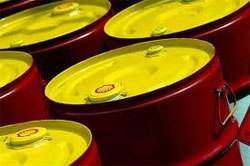Oil price jumps, with all eyes on Fed, US elections
 |
Brent North Sea crude for delivery in December delivery jumped 82 cents to $85.44 a barrel in London trade.
New York's main contract, light sweet crude for December, leapt $1.04 to $83.99 .
"All eyes are on the FOMC meeting tomorrow and the results of the US mid-term elections," said Sucden analyst Myrto Sokou.
"Crude oil prices have surged ... supported by a weaker US dollar and following comments from the Saudi Oil Minister Ali al-Nuaimi.
"It is more the US dollar weakness that helped the oil prices to retest the $84 per barrel area."
The European single currency powered ahead against the dollar in nervous trading on Tuesday, with investors preoccupied by a Federal Reserve meeting that could yield fresh stimulus moves to shore up the flagging US recovery.
The bank's Federal Open Market Committee (FOMC) begins a two-day meeting on Tuesday and is widely forecast to unveil more so-called quantative easing (QE) measures.
The move, dubbed QE2, has weighed on the greenback in recent weeks and months because the policy is expected to dilute the value of the dollar.
Since June, the euro has risen by more than 15 per cent in value against the dollar. A weaker US unit tends to boost dollar-priced oil, which becomes cheaper for buyers that use stronger currencies.
"As the US Federal reserve stands by to announce its next round of Quantitative Easing, this is only likely to push the dollar lower," said analyst Ian Parrett at British consultancy Inenco.
"With dollar-based oil prices, the falling value of the currency means that producing nations need to see the price per barrel rising just so they can stand still in terms of revenue."
Meanwhile, the oil market continued to draw strength from al-Nuaimi, who said on Monday that current oil price levels at above $80 a barrel were within a "very comfortable zone."
Saudi Arabia is the leading producer and exporter within the Organization of Petroleum Exporting Countries, which pumps 40 per cent of the world's oil.
Oil was also lifted this week by upbeat industrial data from the US and China, the world's major energy consumers, analysts said.
Elsewhere, traders digested news that suspected Al-Qaeda militants sabotaged an oil pipeline in the southern Yemen province of Shabwa on Tuesday, a security official said, days after US-bound parcel bombs were traced to Yemen.
What the stars mean:
★ Poor ★ ★ Promising ★★★ Good ★★★★ Very good ★★★★★ Exceptional
 Tag:
Tag:
Related Contents
Latest News
More News
- Cashless payments hit 28 times GDP in 2025 (February 04, 2026 | 18:09)
- SSIAM and DBJ launch Japan Vietnam Capital Fund (February 04, 2026 | 15:57)
- Banks target stronger profits, credit growth in 2026 (February 04, 2026 | 15:43)
- Vietnam on path to investment-grade rating (February 03, 2026 | 13:07)
- Consumer finance sector posts sharp profit growth (February 03, 2026 | 13:05)
- Insurance market building the next chapter of protection (February 02, 2026 | 11:16)
- NAB Innovation Centre underscores Vietnam’s appeal for tech investment (January 30, 2026 | 11:16)
- Vietnam strengthens public debt management with World Bank and IMF (January 30, 2026 | 11:00)
- Corporate bond market poised for stronger growth cycle (January 28, 2026 | 17:13)
- Vietnam's IPO market on recovery trajectory (January 28, 2026 | 17:04)






















 Mobile Version
Mobile Version